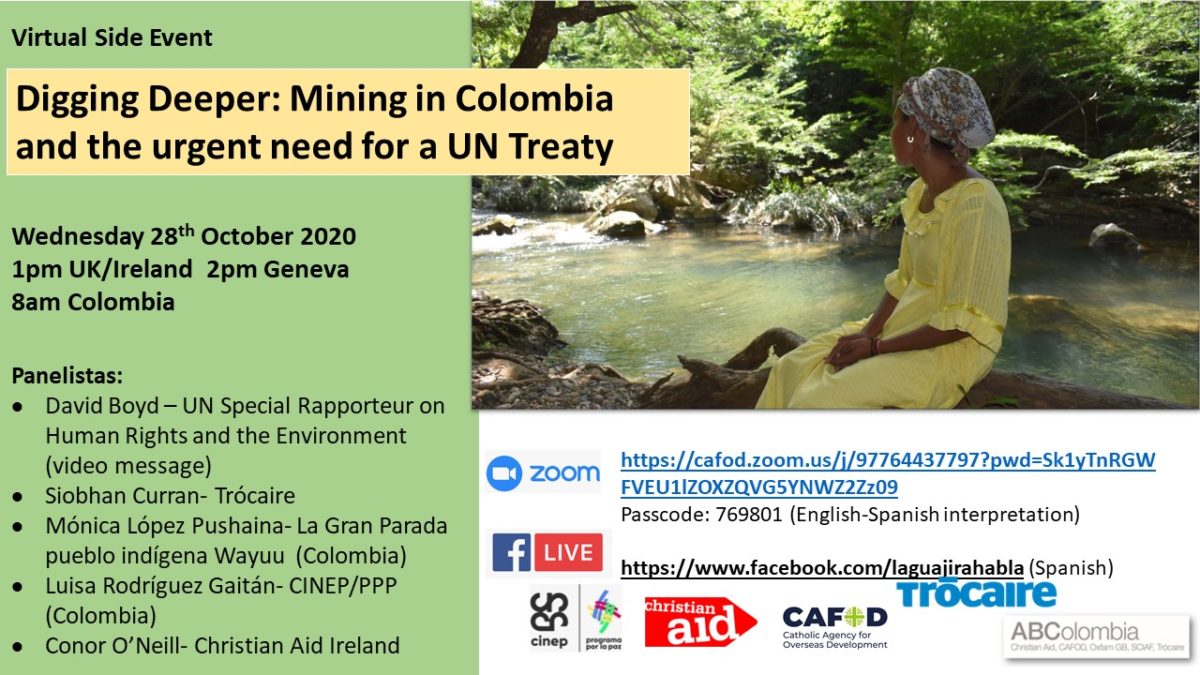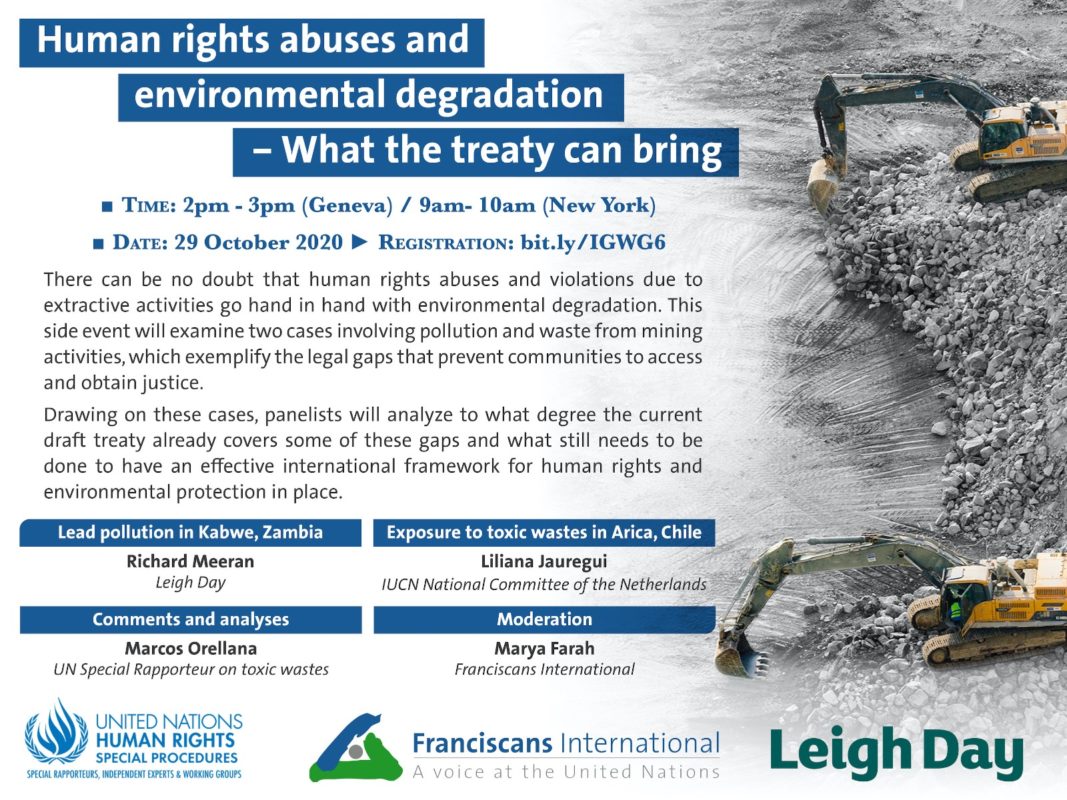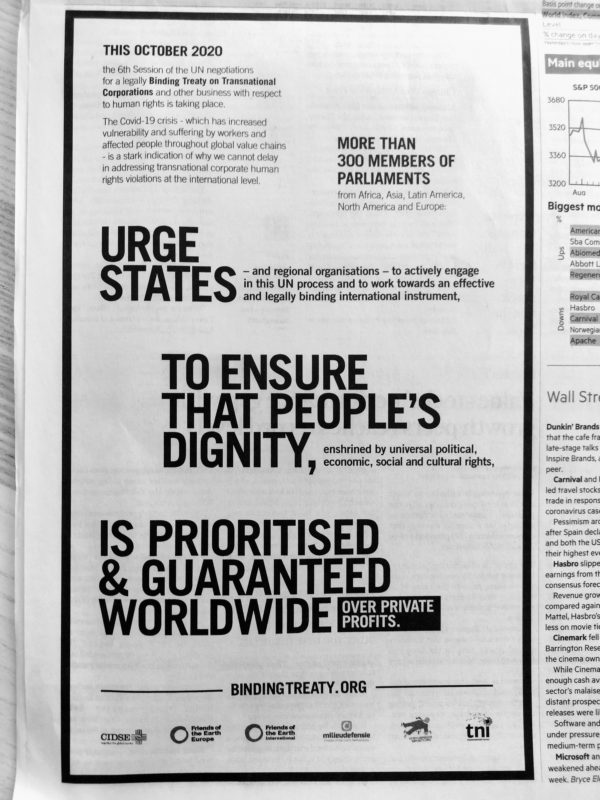As part of its commitment to advocate for human rights above corporate interests CIDSE is, like every year, closely following the open-ended intergovernmental working group on transnational corporations and other business enterprises with respect to human rights (OEIGWG), this year entering its 6th session, taking place from 26 to 30 October.
Because of the COVID-19 pandemics, the session is only partially physical at the UN “Palais des Nations” in Geneva and many stakeholders, including from the CIDSE network, are only connecting remotely.
Press release
CIDSE concluding press release (30th October)
Activities in Geneva by CIDSE, its members, allies and partners :
Statements
- CIDSE general oral statement
- Joint oral statement on obligation to respect human rights in “Preamble & Statement of purpose” with CCFD-Terre Solidaire
- Joint oral statement on article 3 – Enforcing human rights globally – “Scope” with CCFD-Terre Solidaire
- Joint oral statement on articles 5, 6 and 7 with CAFOD and CINEP
- Joint oral statement on article 6 – Duty to prevent and mitigate human rights abuses – Prevention with CCFD-Terre Solidaire
- Joint oral statement on article 12 – Mutual Legal Assistance and International Judicial Cooperation with Franciscans International, FIAN, FIDH and ESCR-Net
- Joint oral statement on Article 14 – Trade with MISEREOR, CCFD-Terre Solidaire, DKA, Trócaire, Maryknoll Office of Global Concerns, Global Policy Forum, and Franciscans International
Side events
-> CAFOD (CIDSE’s member in England & Wales) is organising a virtual side event “Digging Deeper: Mining in Colombia and the urgent need for a UN Treaty” on Wednesday 28th October 2020, 2-3pm CEST on the ongoing struggle to hold transnational corporations and other business enterprises to account for human rights abuses, environmental harm and corporate misconduct they cause, contribute to or are directly linked to in the global south.
More information can be found in the concept note and flyer.

Watch the introduction to the webinar by David Boyd, UN Special Rapporteur on Human Rights and the Environment about the case of El Cerrejon in Colombia and the recording of the side event.
Read the interview with with Luisa Rodríguez Gaitán and Jenny Paola Ortiz from the Centre for Research and Popular Education/Peace programme (CINEP/PPP) on the crucial role of a Binding Treaty for cases like the Cerrejón in Colombia.
-> Franciscans International, the UN Special Rapporteur on Toxic Wastes and Leigh Day will organise an online side event on Thursday 29th October at 2 PM CET on “Human rights abuses and environmental degradation – what the treaty can bring”. See flyer below:

What is the status of the Treaty process?
The ultimate goal of the OEIGWG is to prepare a legally binding instrument to regulate transnational corporations. Following the fifth session, the Permanent Mission of Ecuador, on behalf of the Chairmanship of the OEIGWG, prepared a second revised draft of the legally binding instrument. The 6ths session will work on the bases of such draft.
CIDSE’s position towards the Treaty
CIDSE is concerned by the fact that the EU still does not have a mandate from its member states to negotiate the Treaty, nor does it seek to actively participate or engage in the Treaty Session. The member states also hide behind the fact that it is allegedly only the competence of the EU, and therefore they cannot commit themselves individually. While some states claim that they want a mandate for the EU, the situation is not moving forward and no one gets involved in the negotiations, sometimes not even defending their own national laws. The EU is also hiding behind its own process of implementing Due Diligence legislation, using this excuse not to get involved. For CIDSE it is crucial to stress the complementarity between national, regional and international level.
CIDSE calls on States to constructively engage, with a spirit of determination and a sense of responsibility for the common good, to advance until the “mandate to elaborate an international legally binding instrument” established by UN Human Rights Council Resolution 26/9 is fulfilled. As Catholic development agencies actively involved in the development of policies and laws on business and human rights, CIDSE is determined to continue to offer advice and support to their own governments and other members of the Human Rights Council to help them to meet this important objective.
CIDSE’s complete contribution can be read here in English, French and Spanish.
Treaty support by civil society and CIDSE engagement
CIDSE is one of the leading members of the Treaty Alliance, a global coalition of civil society groups and movements supporting the development of a binding international instrument.
CIDSE also recently supported the African Civil Society Declaration on the African-European Union Partnership in which they call upon European and African policy makers to move to adopt a legally binding UN treaty to ensure that transnational corporations are fully accountable for their human rights violations and environmental crimes.
Together with FoE-E, FoE-I, TNI, Bindingtreaty.org and the Global Campaign, CIDSE published an ad in the Financial Times on 27th October to urge States and regional organisations to actively engage in the UN process and to work towards an effective and legally international instrument :

Church engagement for corporate regulation
CIDSE is inspired by Pope Francis’ constant engagement on the need to regulate corporations, and our common home. In addition, more than 230 Bishops worldwide signed an international declaration to stop corporate abuse and to guarantee global solidarity. Their call was also reiterated by Sr. Mary John Mananzan from the Philippines who highlighted in this blog the crucial role of women in the fight against corporate abuse and form a crucial part of the fight for justice. Back in February, west African bishops called for a binding instrument to regulate activities of transnational corporations.
Further resources from CIDSE and members
- CIDSE policy paper: Strenghtening legal frameworks on business and human rights (Available in EN/ES/FR)
- Report: The 2020 UN revised draft of a legally binding instrument on business and human rights A child rights-based analysis by DKA (part of KOO, CIDSE’s member in Austria)
- Resource page on corporate regulation by CCFD- Terre Solidaire
- Challenging corporate harm during the Coronavirus, article by Trócaire
- Press release & study by Fastenopfer about mining activities by Glencore in the Democratic Republic of Congo (DE – FR)
- Belgian NGOs’ briefing signed by Broederlijk Delen and Entraide et Fraternité (FR – NL)
- Video by Trócaire (CIDSE Member in Ireland): Experts & Activists call for a Global Treaty on Business & Human Rights
Video by CIDSE: Join the movement for a UN Binding Treaty!
Photo: Coal mine, El Cerrejón,Colombia by Tanenhaus – CC BY 2.0

